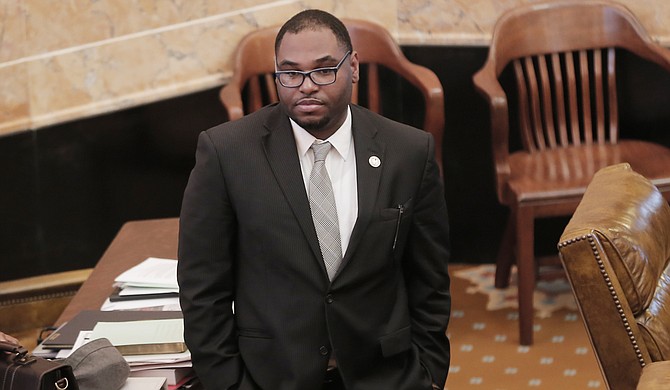Rep. Jarvis Dortch, D-Hinds, manager of the Mississippi Health Advocacy Program, was among those who voted against the bill, saying it would pay a company to build a system the state doesn't need. Photo by Imani Khayyam.
JACKSON — JACKSON, Miss. (AP) — The Mississippi Senate passed a narrower version of a bill Monday that would require an electronic records system for Medicaid and a regular audit of Medicaid recipients.
House Bill 1116 would hire an outside company to build a computerized record of Medicaid recipients' information. The Senate version, approved Monday by a committee, requires that Medicaid officials periodically verify recipients' financial information and residency to determine if they're still eligible for aid. Any recipient found to have left Mississippi would stop getting aid within three months after they left.
The bill would also create a unit within the attorney general's office to investigate Medicaid fraud.
House Republicans passed an earlier version of the bill 76-40 during a partisan standoff in which they had voted to take members' speaking privileges, which Democrats had used to stall bills.
It would require the records system check against federal databases for a broad range of information including military veteran status, death records, utility payments, and a database of anyone who has received a state license or certification that cost more than $500.
Aid recipients would have to verify their records every three months by answering computerized "knowledge-based quizzes" to prove their identity. Any discrepancy would earn a written notice; those who don't respond in writing within 10 business days would have their aid cut indefinitely.
The bill would also change the Temporary Assistance for Needy Families and Supplemental Nutritional Assistance Program programs. It says Mississippi won't ever again seek a waiver of work requirements for food stamp and welfare programs and that Mississippi's programs can't be any more generous than required by federal law. A family wouldn't be allowed to count a newborn as a household member if the household received welfare aid for the previous 10 months.
Anyone found to have violated the work requirements for welfare and food stamps would eventually lose aid for themselves and possibly their entire household.
Rep. Jarvis Dortch, D-Hinds, was among those who voted against the bill. The Mississippi Health Advocacy Program manager said the bill would pay a company to build a system the state doesn't need. The Division of Medicaid and the attorney general already screen for and prosecute fraud, which is mostly committed by health care providers who allow the state to keep sending benefits without notifying officials that recipients no longer need them, he said. Any discrepancies the system finds would still have to be handed off to those agencies.
"It's going to cause a lot of trouble and waste a lot of money," he said.
Dortch said Mississippi already has the lowest bar in the country for people to get aid that the federal government allows. He said most Medicaid recipients are working families with children that have no other options for health care coverage.
He said written letters, 10-day notices and photo identification cards don't matter when aid recipients are unable to respond because of poor health, disabilities or lack of a vehicle.
"They're setting up a lot of traps for people to fall through the cracks," he said. "The intent of the bill seems to be to kick people off the programs."
The bill must be passed by the full Senate.
ALSO AT THE CAPITOL
— Walter Michel returned Monday to the Mississippi state Senate after winning a special election for a seat covering parts of Hinds and Madison counties. The Republican Michel, sworn in by Lt. Gov. Tate Reeves, defeated retired businessman Bill Billingsley for the District 25 seat March 8. The seat opened after Gov. Phil Bryant appointed Sen. Will Longwitz as Madison County Court judge in January.
— Gov. Phil Bryant signed into law Senate Bill 2808, which creates a state fund for workforce training programs using money from the state's unemployment tax. The program, mostly to be administered by community colleges, will start off with $10 million in its first year. The bill also cuts the minimum unemployment tax rate that employers pay to zero. Reeves said the cut could save businesses up to $195 million over the next decade.
Copyright Associated Press. All rights reserved. This material may not be published, broadcast, rewritten, or redistributed.



Comments
Use the comment form below to begin a discussion about this content.